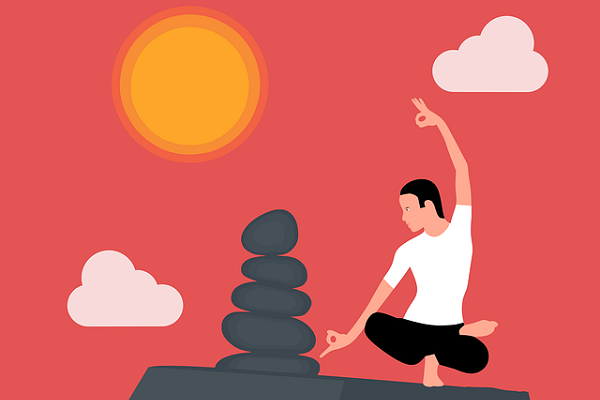Our body functions with a dynamic balance. It is this balance that helps direct all functions of life. This is called homeostasis. In other words, keeping things static or constant. Our body is somewhat like a spinning wheel. So long as it is spinning, or working, dynamically, all our body systems stay in fine shape, or balance. No matter the assault from outside forces, our body has the resilience and that innate ability to return to its upright position, naturally.
The functional realm of our body, or physiology, is maintained through homeostasis and self-regulatory mechanisms of the body. There are a host of feedback chains in the body, as you may know, that also ‘fuel’ basic adjustments in our physiology. For example, when the carbon dioxide content of our blood begins to rise, we breathe-in air more deeply. Likewise, when you drink far too much coffee, or tea, there is increased urination. Besides, when our immune system identifies a protein foreign to your system, it produces antibodies to drive the protein out of transmission — much before it can cause harm.
Self-Regulation
Such self-regulating activities happen without our knowledge; they are not tangible. What guides the organising principle that runs us all — from our immune function to our bioclocks — is difficult to observe directly. Physiologists believe that there is an underlying principle that guides our body to live, think, eat, digest, reproduce, and move.
It is this defence mechanism that helps our body to repel invading organisms. It keeps all of our internal biological functions running smoothly. It is for this reason that we consider a person dead when their body stops working. This is the difference between being alive and being history.
Homeopathy lays the greatest emphasis on a person’s individual constitution before treatment. In homeopathic parlance, a person’s ‘constitution’ describes their state of health, temperament and any inherited, or acquired characteristics.
Homeopathy suggests that healthy people defend against developing sickness, despite being all the time exposed to a variety of harmful viruses and bacteria. The reason for this healthy defence is simple. Their vital force — or, prana, in Sanksrit, or chi, in Chinese — is strong. Hence, their vulnerability to illness is low. Their degree of susceptibility to ill-health may change, however, from time to time.
The Individual. Not Just The Illness
Homeopathy treats the individual; it just does not limit its treatment to the diagnosis of an illness. When you are ill, your illness has its own unique pattern of symptoms. You tend to get illnesses that result from the particular pattern of imbalance that is unique to your personal temperament and environmental factors.
If you have a flaw in the urinary system, you develop symptoms of a bladder infection or renal [kidney] disease. If your skin has a flaw, you may develop rashes, herpes, dermatitis, or warts. If your digestive system is the focus, you may present with symptoms of hyperacidity, flatulence, constipation, piles [haemorrhoids], or ulcers. These can, of course, be corrected with suitable, or appropriate, homeopathic remedies.
This is not all. There may also be patterns of certain illnesses that run in families — they may be passed on from generation to generation. Yet, the interesting fact is — people with the same illness, or diagnosis, will not need the same homeopathic remedy. There is no one homeopathic treatment, for instance, for allergy. The allergy you present with requires a homeopathic remedy that matches your particular pattern of symptoms. Your colleague’s allergy, on the other hand, will respond to an entirely different homeopathic remedy.
The flu you may present with, for example, could have resulted after exposure to sudden cold, dry winds. This may be followed by fever. To your surprise though, one of your cheeks is pale and the other red. You sneeze violently, your nose runs like a drainage pipe, and you have a nagging, dry, croupy cough. You feel totally restless. Your mouth is extremely dry and you can’t quench your thirst. The more you drink, the thirstier you will be. You also, at the same time, feel chilled to the hilt. This is individualistic — it’s unlike the flu symptoms one of your friends may have. So, you will, according to homeopathy, need Aconitum napellus — to restore you back to health.
Each of us experiences some state that may limit us in some way too. Staphysagria is useful in people who are deeply depressed and angry with self-destructive tendencies — the trigger being emotional distress, or shame, experienced during childhood. Such a state may influence them not only to intense anger states, but also to a number of physical ailments, such as allergies, joint pain, and sensitivity to light. It is through the understanding of such states that professional homeopaths are able to treat your body, mind, and emotions simultaneously — safely, and effectively, too.
Symptom-Picture
Modern immunology evidences that the body has the ability to ‘remember’ every ‘attack’ on the system that it has responded to. This process also confirms our capacity to remember stress, emotional distress, exposure to allergens, or intake of strong medications.
There may also be certain underlying ‘miasmatic’ factors that affect the ability of the ‘vital force’ to withstand any onslaught. This is one reason why homeopathy prioritises the patient’s ‘constitutional, or individualistic type’ when prescribing medicines. In other words, a remedy is given whose ‘symptom-picture’ matches with the individual’s psychological and physical attributes, or features, when healthy.
When homeopathic medicines are taken in the healthy state, they help strengthen our ‘vital force’ and also enhance resistance to developing illnesses that may be waiting to happen.
Homeopathic remedies also work to sustain the self-healing powers of the ‘vital force’ in its response to illness. This includes speeding up recovery time from acute illness, or making the duration of the illness less bothersome. This also includes naturally-assisted recovery from recurrent illness and/or preventing their recurrence.

